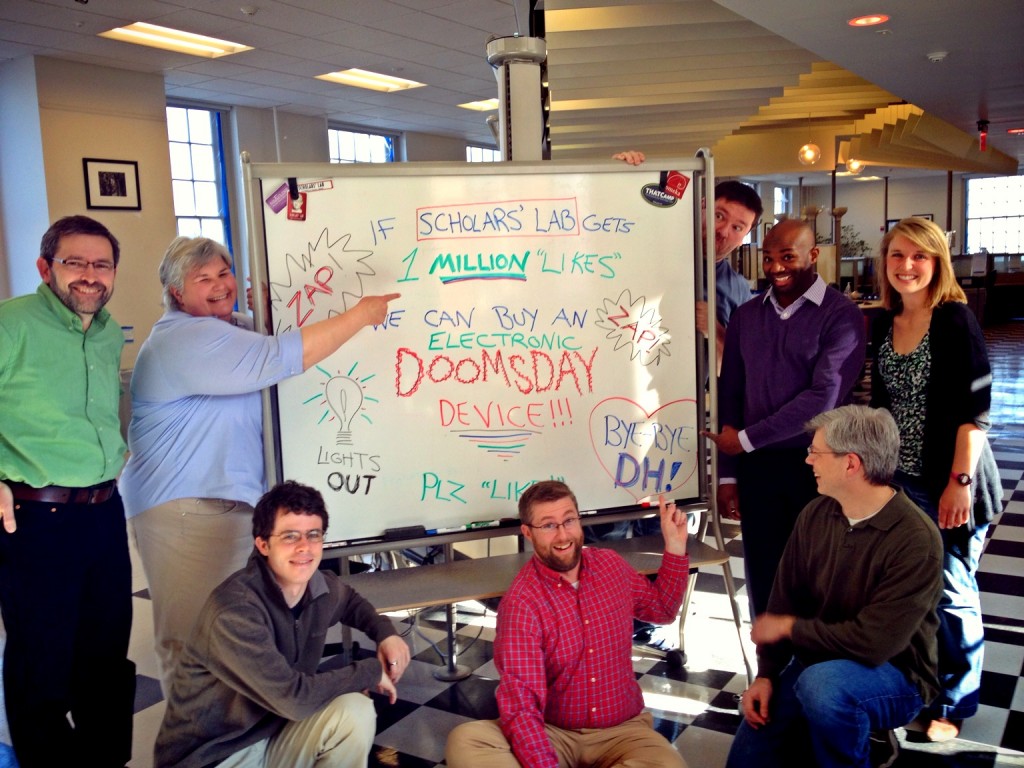Scholars’ Lab Campaigns for a Million “Likes”
TRANSCRIPT
A new social media campaign is taking Facebook by storm! Staff of the Scholars’ Lab, a prominent University of Virginia-based academic technology center, have gone viral with an adorable picture and charming plea. This is not the first time the SLab has captured the collective imagination of the international digital humanities community – but it may be the last!
[PHOTO: Smiling staff gather around a whiteboard that reads: “If the SLab page gets a million “likes,” Bethany will buy us an EMP doomsday device! Zap! Lights OUT! (Sci-Fi 4-EVA) Bye-bye, DH! (She doesn’t think we can do it!) Please LIKE!”]
SEAL: It all began in the early hours of March 28th, when Wayne Graham, head of Scholar’s Lab R&D, received a call from systems administrators informing him he was to spend the next 16 hours tracking down the source of unusual activity on one of the lab’s servers.
GRAHAM: I just couldn’t BEEEP_ing believe the BEEP BEEEP BEEP-BEEP_ers BEEP BEEEP_ed the BEEP BEEP BEEEP BEEP-box again._ BEEEEEEP.
Meanwhile, Ronda Grizzle, who handles communications for the SLab, was waking to a message of her own.
[CLOSEUP: Inbox. Email title reads: “Re: Re: RE: Newsletter Draft 47b-rev6 - just 1 more little tweak, plz!”]
In a characteristic display of Scholars’ Lab camaraderie, Neatline developer David McClure (who quite possibly sleeps at his desk) was waiting to comfort Grizzle on her arrival at the office. But things went rapidly downhill.
Investigating “ongoing, illicit humanities crowdsourcing / sweatshop activities,” student reporters from the Cavalier Daily delivered a FOIA request to stunned graduate fellows in the SLab Grad Lounge, site of the Library’s innovative Praxis Program. At the same time, a malfunctioning Ron Swanson chat-bot attached to the SLab’s IRC channel began to exhibit what Brooklyn-based staffer Dr. Katina Rogers called “disturbing signs of sentience.”
ROGERS: [via chat] or maybe I’ve just been hanging out in here too long <j/k> waynebot++ #slab IRC FTW!
By the end of what some observers called a “not atypical” Thursday, emergency personnel had been called to Alderman Library twice (first treating administrative assistant Becca Peters for severe paper-cuts incurred while processing fifty thousand Scholarly Communication Institute travel reimbursements, and later hurriedly wheeling a large, struggling man, prostrate and bound, to a waiting, unmarked van). Colleagues identified the man as Design Architect Jeremy Boggs. UVa Today was on the scene for this incident, and approached public services chief Eric Johnson for comment.
JOHNSON: [sitting morosely beside a 3d-printer adorned with Scholars’ Lab stickers] He’s been trying to level the build-plate. I – I just can’t talk about it! [sobs]
The same afternoon, GIS specialists Chris Gist and Kelly Johnston saw their popular program in “DIY aerial photography” crash to earth, as Charlottesville city council members authorized aggressive counter-measures to halt the Scholars’ Lab’s use of a helium balloon and small, mechanized quad-copter to photograph archaeological sites and public art installations at the request of UVa faculty.
GIST: A sling-shot, Councilman? Seriously? JOHNSTON: [angrily] That was NOT a drone!
But it was in his support for the lab’s core activity – enabling UVa faculty and students to perform research and scholarship using new technology – that Senior Developer Dr. Eric Rochester found a way forward.
ROCHESTER: I was painstakingly refining our web-based approach to delivering scanned historical maps to scholars for analysis and display, when my fingers slipped. Delete! It was… life-changing.
His colleagues agreed, and Scholars’ Lab director Dr. Bethany Nowviskie issued a challenge. One packet of dry-erase markers and a Facebook post later, the campaign was underway. We caught up with Nowviskie, to hear her response to staff ambitions to destroy the digital humanities once and for all, using a devastating global electromagnetic pulse from a “doomsday device.”
NOWVISKIE: Well, it’s important to say that I’m still waiting to hear from Procurement about whether I can put equipment capable of forever ending worldwide electronic communications on my UVa VISA card. But, to speak to the viral aspects of the project: perhaps I should have seen this coming. After all, a few years ago I had the experience of popularizing a Twitter hashtag among DHers and so-called alt-academics which, by some accounts, sparked an important movement in higher education.
SEAL: You refer, of course, to #fortranDH.
NOWVISKIE: The wave of the future.
But not according to her staff and their many supporters. At last count, the winsome smiles and can-do attitude the team exhibited on Facebook had garnered their SLab page a whopping 323 “likes” – well on the way, say Scholars’ Lab-trained digital humanities librarians Dr. Alex Gil (Columbia U) and Jean Bauer (Brown University), to the winning million.
BAUER: I clicked! And so have all my friends and colleagues, who work unceasingly to re-mediate, describe, and contextualize humanities texts and artifacts; to collect, visualize, and preserve born-digital information; to develop and test new analytic methods and modes of scholarly communication; and to use technology to question received notions of canonicity and expert knowledge. We see this as a game-changer – a once-in-a-lifetime opportunity for the entire field of DH.
GIL: [from atop the barricades] Faculty, staff, and students! The time has come! I really, really, really need a nap.
UVa Library grants officer Raylon Johnson could not be reached for comment. Friends in Financial Services indicated he may be headed “somewhere tropical,” adding, “Don’t worry about Ray.”
Long-term humanities computing practitioners identify the past sixty years of interdisciplinary, technology-assisted scholarship as a pragmatic and intellectual struggle toward new interpretive paradigms for historical understanding and the ongoing study of human arts and cultures. Others see the digital humanities as a fresh, recently-emerging, sweeping trend – the academy’s “next big thing.”
But thanks to the Scholars’ Lab at the University of Virginia Library, a different consensus is building in social media: when it comes to DH, we’re almost done.
** * * END TRANSCRIPT * * **

